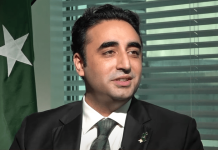——— Reviews preparations for 12th Pakistan-UAE JMC
By Our Diplomatic Correspondent
ISLAMABAD: Deputy Prime Minister and Foreign Minister Ishaq Dar on Friday reviewed preparations for the upcoming 12th session of the Pakistan-UAE Joint Ministerial Commission (JMC) to be held in Abu Dhabi, a statement from the Foreign Office said.
The 12th session of Pak-UAE JMC is being held following a hiatus of 13 years after it was scheduled in October 2024. The 11th session was held in Islamabad from 6-7 November 2013.
“Dar chaired a high-level meeting that discussed advancing key bilateral initiatives, formalising collaboration in existing sectors, exploring new avenues for cooperation, and attracting mutually beneficial UAE investments in priority areas,” the FO statement said.
“The deputy prime minister reiterated Pakistan’s firm commitment to strengthening Pak-UAE economic and trade relations.”
The meeting was attended by federal secretaries of economic affairs, commerce, maritime affairs, interior, inter-provincial coordination, national heritage, and health, along with senior officials from relevant ministries and departments, and special assistant Tariq Bajwa.
The UAE is Pakistan’s third largest trading partner after China and the United States, is home to more than a million Pakistani expatriates, and is the second-largest source of remittances to the South Asian country after Saudi Arabia.
Pakistan’s Ambassador to the UAE Faisal Tirmizi earlier this year said that the bilateral trade between Pakistan and the UAE exceeded US$10.9 billion in the fiscal year 2023–24, including goods and services.
The envoy also disclosed that remittances from the Pakistani community in the UAE reached $6.7 bn in 2024. He noted that during the period July 2024 to January 2025, goods trade rose by 21.63pc, with Pakistan’s exports growing by 7.53 per cent, indicating sustained momentum in economic engagement.
According to Ambassador Tirmizi, goods trade in 2023–24 reached $8.41 bn, with Pakistan’s exports rising by 41.06pc to $2.08 bn, while imports from the UAE declined by 14.45pc to $6.33 bn, resulting in a 28.28pc reduction in the trade deficit.
In the services sector, total trade stood at $2.56 bn, marking a 20.54pc year-on-year increase.
He added that there were 19 Emirati companies currently operating in Pakistan and the UAE had invested significantly in key sectors such as communications, services, tourism, information technology, oil and gas, housing, banking, and real estate.
A day earlier, Prime Minister Shehbaz Sharif met UAE President and Ruler of Abu Dhabi Sheikh Mohamed bin Zayed Al Nahyan during his official one-day visit to the Gulf state, where he discussed matters of bilateral and regional interest.
The high-level engagement aimed at reaffirming Pakistan’s gratitude to friendly nations that supported Islamabad’s position during its recent standoff with New Delhi.
PM Shehbaz conveyed his sincere gratitude to the UAE leadership for its “constructive role” in helping defuse tensions during the recent conflict between Pakistan and India. He appreciated the UAE’s positive role in promoting peace, dialogue and stability in the region.
Tensions flared following what Islamabad termed a “false flag operation” by India in the mountainous resort town of Pahalgam. In the wake of the incident, both countries carried out missile and air strikes. According to Pakistan’s military, India lost six aircraft in the exchange, including a Rafale fighter jet.
According to the Prime Minister’s Office, the meeting underscored the deep-rooted, brotherly relations between Pakistan and the UAE, built on mutual trust, shared values, and a history of close cooperation.
The two leaders discussed a wide range of bilateral, regional, and global issues of mutual interest, and reaffirmed their commitment to further enhancing collaboration in key areas.
Both sides expressed satisfaction over the positive trajectory of bilateral ties and ongoing engagements at all levels. The leaders agreed to maintain close coordination and continue working together to advance shared goals of regional peace and prosperity.






